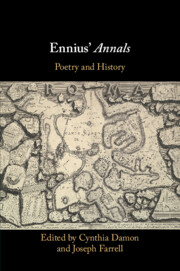Book contents
- Ennius’ Annals
- Ennius’ Annals
- Copyright page
- Dedication
- Contents
- Contributors
- Abbreviations
- Introduction: History and Poetry in Ennius’ Annals
- I Innovation
- II Authority
- Chapter 4 Allegory and Authority in Latin Verse-Historiography
- Chapter 5 Reading Ennius’ Annals and Cato’s Origins at Rome
- Chapter 6 Looking for auctoritas in Ennius’ Annals
- Chapter 7 Ennius’ Annals as Source and Model for Historical Speech
- III Influence
- IV Interpretation
- Afterword
- Works Cited
- General Index
- Index Locorum
Chapter 6 - Looking for auctoritas in Ennius’ Annals
from II - Authority
Published online by Cambridge University Press: 10 April 2020
- Ennius’ Annals
- Ennius’ Annals
- Copyright page
- Dedication
- Contents
- Contributors
- Abbreviations
- Introduction: History and Poetry in Ennius’ Annals
- I Innovation
- II Authority
- Chapter 4 Allegory and Authority in Latin Verse-Historiography
- Chapter 5 Reading Ennius’ Annals and Cato’s Origins at Rome
- Chapter 6 Looking for auctoritas in Ennius’ Annals
- Chapter 7 Ennius’ Annals as Source and Model for Historical Speech
- III Influence
- IV Interpretation
- Afterword
- Works Cited
- General Index
- Index Locorum
Summary
In the present paper I explore the Annals looking for demonstrations of historiographical authority. More specifically, I look for traces of a historiographical response to the crisis of authority created by the existence of conflicting stories about the past. I begin by reviewing the the poem’s expressions of dubiety, to see whether any of them reflects narrative uncertainty. I then turn to the intractable historiographical uncertainties involved in recounting the reign of Numa, an episode of Rome’s long history made newly topical by an event contemporary with the composition of the Annals: the discovery, investigation, and destruction of books purporting to have been written by Numa. I ask whether the poet made use of historiographical dubiety to bolster his authority in the face of the unknowable, and if not, how else he might have validated his material, concluding that if Ennius’ Annals counted as Roman history for Cicero or Lucretius or even Livy, it was because his version of the maxima facta patrum was useful to them, not because it was taken to be a reliable guide to what could be known about the past.
- Type
- Chapter
- Information
- Ennius' AnnalsPoetry and History, pp. 125 - 146Publisher: Cambridge University PressPrint publication year: 2020
- 1
- Cited by

